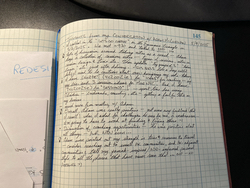I return often to Kleon’s matra of “show your work“.
I always fade out from the process. I think the reason is that I’m not necessarily doing something related to podcasting every day. (Which is fine.) Without a strong habit of podcast-specific work (for example, “I do podcast stuff at 9am every day”) I don’t get in the habit of doing the extra little bit of work to capture something showing my work…
I’m convinced, my work would be better—and it would help others too—if I showed my work more. But I can’t seem to crack this nut.
Zooming out, away from podcasting . . .
I keep thinking: I don’t have a clear, single thing that is “my work” — it’s not podcasting, it’s not blog writing, it’s not community building [here], … For example: Here’s some notes I took, over the course of an hour thinking about coaching movement, based on a long conversation I had with a coach I respect. We had a coffee meeting where I wanted to pick his brain…

I post all sorts of things here, on the ‘ol blog. In recent years, my posting grew, become a weekly thing which I cleaved off to be the 7 for Sunday weekly email. Here I continue to post new quotes from my collection, copies of all the podcast episodes I do [all shows, anywhere], and a lot of “this is interesting” links that I find.
This morning, I’m thinking: My blog has long been the place where I work with the garage door up. Maybe I should lean into that?
…develop the habit of showing something (anything, from any project I’m working on) there on my blog. 🤔
ɕ









